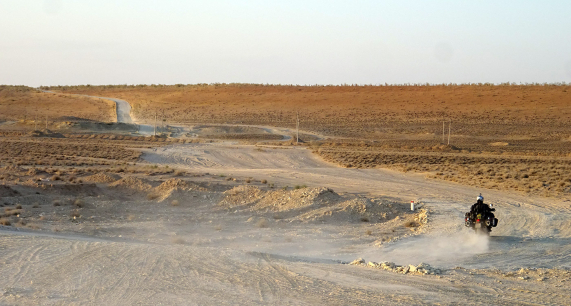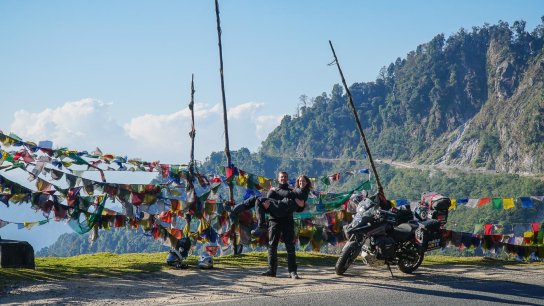China
Travel by Motorbike in China
Already expecting overflowing bureaucracy and fussy luggage inspection entering the country was even worse than imagined. When going to China with the own vehicle one has to book a guide through a licensed travel company during the whole stay. Needless to say that this is very expensive. We decided to book the shortest version possible: a four day-transit-tour with Kashgar Newland travel company from Kyrgyzstan to Pakistan.

First we had to exit Kyrgyzstan. Normally we just showed our passports, got an exit stamp and were free to go. On the border to China that was not the case. Before the official exit point there were two different military checkpoints where we had to show our Chinese visa and had to open our bags. This took quite a long time and required some patience. On the last checkpoint one officer even wanted to keep our small helmet camera although we didn`t even use it. He saw us packing away the GoPro, snatched it, put it in his pocket and told us to drive on. He would check our video material later. We protested vehemently and Peter ran after him immediately loudly involving other officials. In the end we showed them the videos on the camera. As they didn`t find anything incriminating we were allowed to go on with our camera.
Standing at the Chinese border gate at over 3000 meters and enjoying the fantastic view we realized how far we already got with the motorbike.
The gate opened and the Chinese officials directed us to come inside. On the Chinese side a man came towards us and told us smiling:“Hello, nice to meet you, I am Abdul, your guide. Just follow me with the bike”. We went many kilometers through no man`s land until we came to a big building. Abdul told us to remove the soft bags from the bike as they were going to be scanned. Furthermore we had to go inside the building for the passport control. With the bags we went inside and waited for them to be x-rayed. Meanwhile they asked us to give them our unlocked phones and walked away with them. Once our bags were finished we took them and went to the next desk where they were just looking at all the photos and videos on our phones. It was an awkward feeling watching strange people looking through our private stuff. They even installed a special spy software to watch every step we take. Goodbye privacy, we thought. Later our motorcycle was x-rayed in a special room that looked like a huge carwash tunnel able to fit about five big trucks.
We also met a group of German, Austrian, and Swiss tourists driving in a bus on their way out of China. It was very interesting to talk to them and exchange information. They called the province Xingjang a “maximum security prison” where local minorities were being watched and even held prison if they did something out of order.
After the border officials finished their lunch we were allowed to drive on. The roads were in a terrible condition and we had to ride a slalom to avoid potholes. Our guide had told us before that it was strictly forbidden to take any photos or videos in this area. We saw cameras every few meters on the road. On the side of the road there were buildings protected with barbwire looking like prisons. Watching closer we even saw some children playgrounds. In the whole area we saw hardly any normal houses or villages.
At the next police station we had to go inside for another passport control. Also the motorcycle panniers were being searched once again. We went on and saw the same prison-like buildings with playgrounds once more. On the perfectly new street there was no other car anywhere to be seen. Considering the huge waiting queue of trucks at the border before it was very strange.
Our next stop was another border building where Abdul told us that the motorcycle had to get disinfected. Peter should drive through a tunnel where some strange smelling drizzle suddenly appeared. On the other side he came out again completely wet.
With our newly disinfected bike we rode a bit further to another building where our bags once again got x-rayed. One time apparently wasn`t enough. Furthermore we had to open each bag and show them every item. They put aside our canned vegetables and one tomato as they were forbidden to bring into the country. Another passport control followed where a machine automatically told us in German where to put our hands to save our fingerprints. A few weeks ago, in the neighboring country Tajikistan there was no electricity at all in some areas and now a machine was talking to us in our mother tongue. Additionally our faces were scanned.
Outside the building Abdul told us to leave the motorbike there for the night and continue tomorrow. There were still many things to do like getting a Chinese number plate and a Chinese driving license. We were allowed to put some stuff for the night in our bags. On our way to Kashgar we had to stop for another passport control. Hundreds of electric scooters were driving on the streets. They had a whole lane just for themselves.
We stopped at a huge hotel complex. Entering the huge luxurious building we felt strange. The night before we slept in a cold simple yurt without heating. As the Chinese time was two hours earlier than the Kyrgyz time it was already late and we decided to find a place to eat. The waitress in the restaurant didn`t speak English so we just ordered some noodles that tasted really delicious and back in the hotel we fell asleep immediately.
The breakfast on the next morning was different than every other we ever had: soup, noodles, cooked vegetables and meat with soya sauce were available. There were also “normal” things like fried eggs, toast and tea.
Peter had to go back to the border station to continue the paperwork, whereas Claudia was lucky to stay in the hotel. To get the Chinese driving license and Chinese number plate was a complicated procedure again that took many hours. A few hours, many passport controls and face scans later he was officially allowed to bring the motorcycle to Kashgar.
We spent the rest of the day wandering around the old city of Kashgar, which was demolished in 2009 by the Chinese government and rebuilt nearly completely. The official reason was to protect it against earthquakes. Although we would have loved to visit the original old city it was still nice to walk around and watch children playing in the newly built streets of Kashgar Old Town.
In the evening we saw another travel motorbike parked next to ours. The owner, Gerhard, a friendly Austrian, was travelling from India to Austria. His son did the way from Austria to India with the same motorbike and he was going back. We spent a nice evening together exchanging information and having fun.
The original plan was to go to Tashkurgan on the third day and spend the night there. Our guide should pick us up at 10:00 in the morning so we had already finished preparing our bike one hour before to have enough time for a good breakfast. Sitting at the table with Gerhard and a Pakistani our guide came in looking very stressed and nervous and told us to leave immediately because the border to Pakistan would be closed for the next five days. We should try to do all paperwork and cross to Pakistan in one day instead of two. The Pakistani guy at the table immediately protested and told us that there was no holiday in Pakistan and the borders would be open all the time. We shouldn`t listen to our guide. The guide answered quite angrily that the Pakistani guy wouldn`t know anything and we should hurry up. It was hard to leave the tasty breakfast behind but we got up and went outside.
We quickly got on the bike, said goodbye to Gerhard, who wished us all the best, and drove behind our guide`s car. After a few minutes we had to stop at a police control. There were cameras everywhere, countless policemen, SWAT units and even a man with a machine gun standing above. When we were finished with passport controls our guide told us that the speed limit for 60 kilometers per hour wouldn`t apply for foreigners so we should drive as fast as we can. He would meet us in Tashkurgan as soon as possible at the petrol station. We did as we were told and started riding on the Karakoram Highway towards Tashkurgan very fast. The scenery was fantastic and we regretted not having more times to take some pictures. There were glittering blue lakes and very high snowy mountains everywhere. We even saw camels walking on the road.
A few hours later we reached Tashkurgan with an empty tank. At the petrol station there was a long queue of waiting cars. Petrol stations in this area of China are heavily protected with barbwire and policemen controlling everyone. Chinese people have a special identity card they show to the officials and then the gate opens. Of course we didn`t have anything like that and our guide had told us before that it was illegal for foreigners to get petrol. We still tried and showed them with our hands to fill up the tank. The policeman asked for our passport and told us to wait. Surprisingly after a few minutes he told us to go on and opened the gate for us. After filling up our tank we parked the bike outside the fence and waited for our guide to arrive. Sitting next to our bike we attracted a lot of attention. People were very curious and took many pictures of us and the bike. They even gave us fresh fruits and were very friendly.
When our guide arrived after two hours, we went to the official border building not far away. Again we waited for some time for the gates to open so we could enter the border area. We had to park our bike and remove all our bags again. Our guide told us that the Chinese border was officially closed at that time of the day and that they would come and open it again just for us. He also told us that we would wait for four other motorcyclists. Officials didn`t start working before they arrived. About one hour later the door opened and the other bikers came in also looking a bit stressed. The three Canadians and one Spanish guy had the same experience and were also informed on short notice about the border being closed. Together we stood and waited for the passport control as the door opened and three officials arrived. Seeing us talking they rudely commanded to stand in line. After the passport control and face scan we had to position our motorbike in front of a camera and were free to go. Our guide told us to ride the remaining 120 kilometers to Khunjerab pass fast without stopping and taking pictures. So we started towards the famous Khunjerab pass, the highest paved border crossing in the world. The scenery was again fantastic and it was getting colder as we went higher. The sun was already behind the mountains.
When we arrived at the military building the officials checked our passports and we were allowed to continue to the real main border gate. When they opened the gate for us we felt free again. On the Pakistani side we were greeted very friendly with a “Welcome to Pakistan! You must be cold. Do you like a warm cup of tea?”.

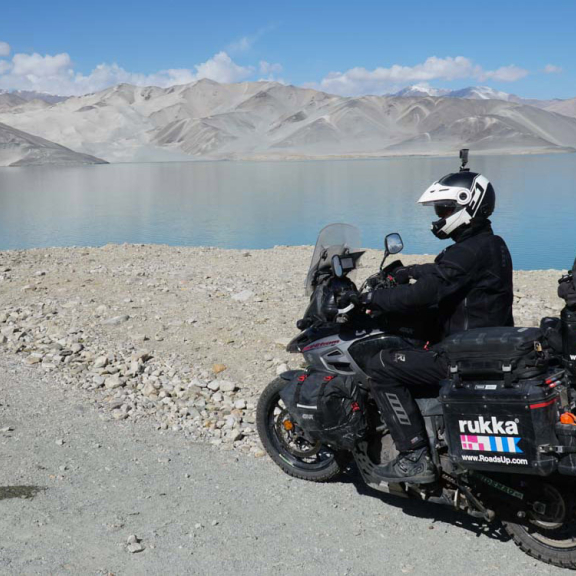
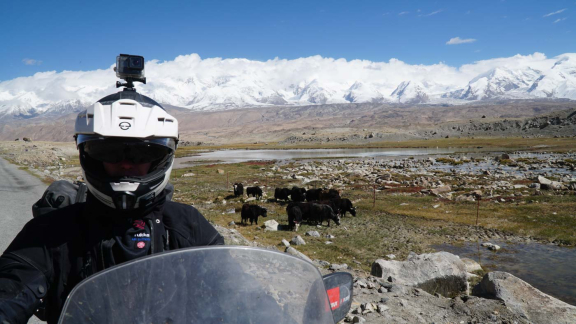
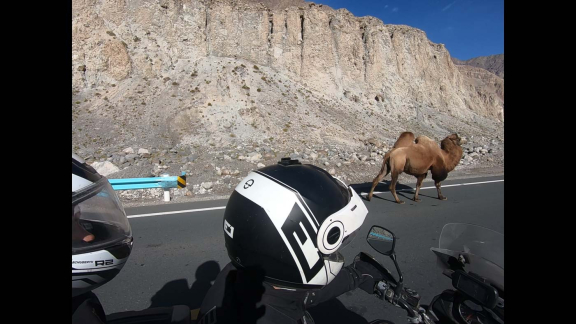
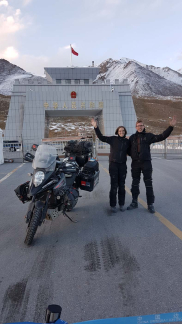
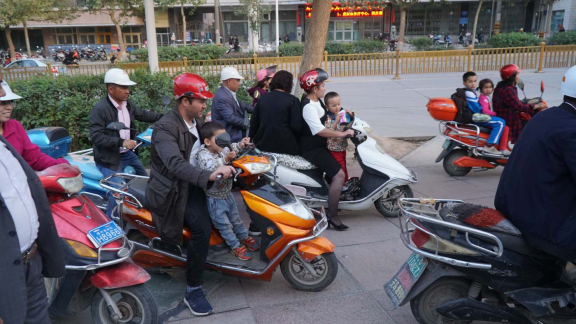
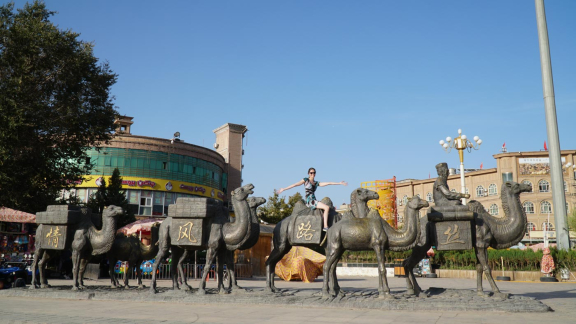
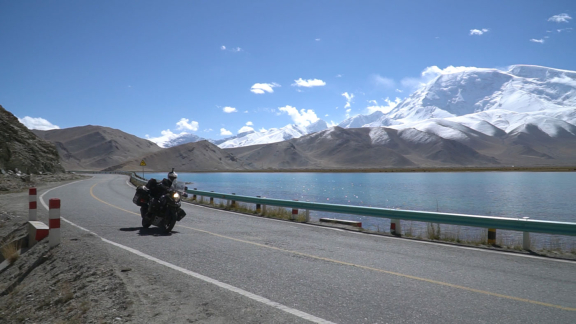
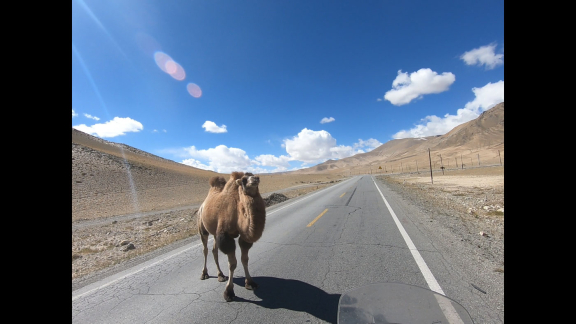
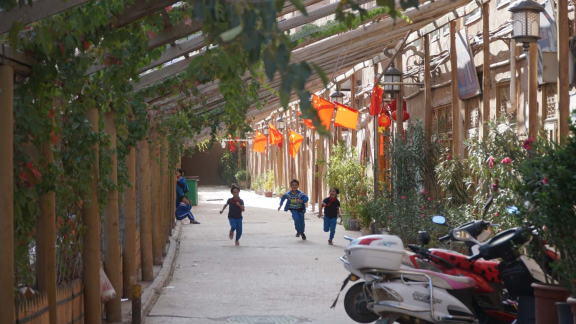
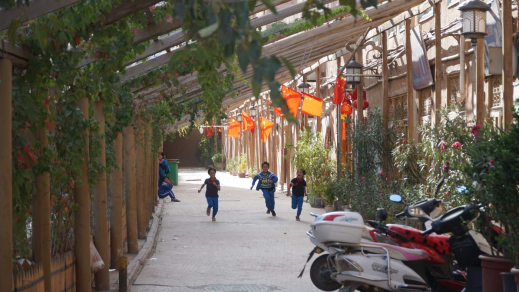
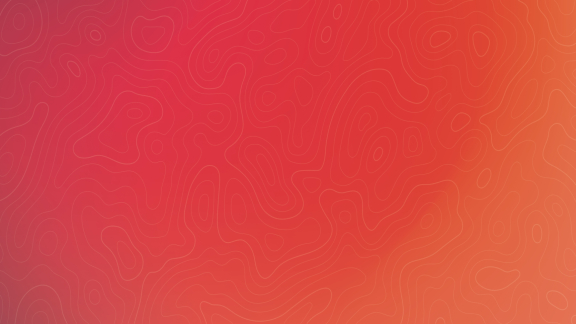
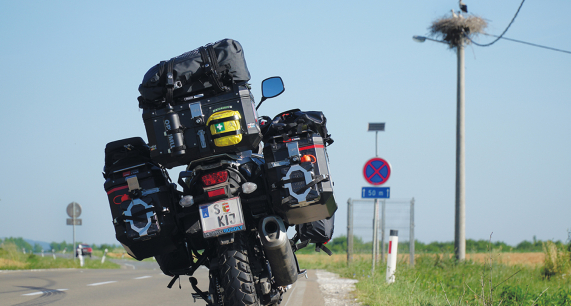
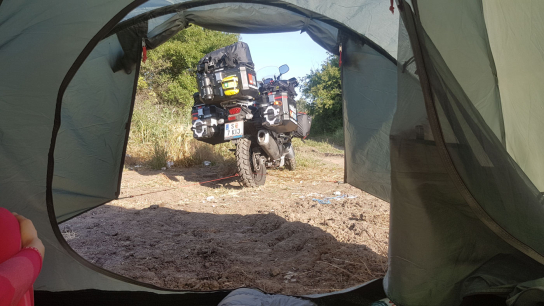
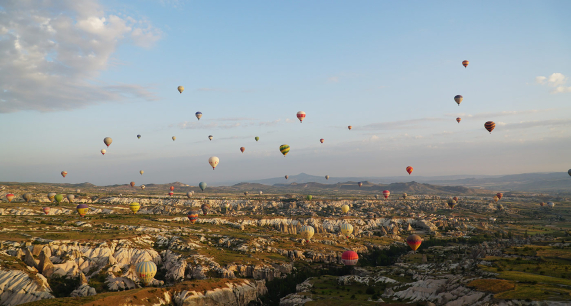
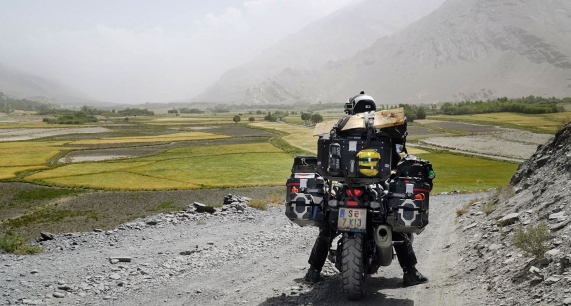
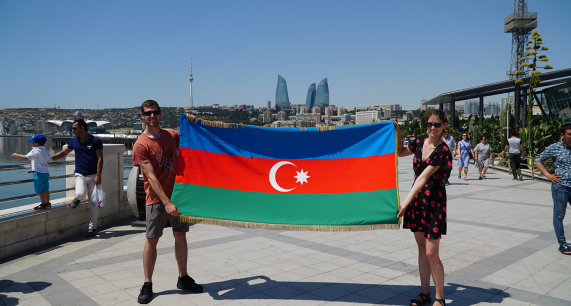
.jpg)
